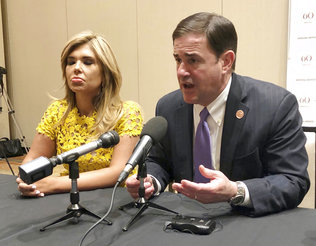
Arizona Gov. Doug Ducey talks often about the strong partnership he has fostered with his neighbor to the south, Gov. Claudia Pavlovich of Sonora, Mexico. And the former chief executive of an international business is an ardent supporter of free trade and the easy flow of business across the border.
He’s also a strong supporter of Donald Trump and consistently backs the president’s threats to shut the border or unilaterally impose tariffs — policies that, if carried out, would be a major setback to cross-border business that he has tried so hard to nurture.
Ducey’s struggle to balance it all was on display last week at a conference in Phoenix where he and Pavlovich commemorated the 60th anniversary of the Arizona Mexico Commission, which promotes stronger ties between their states. Ducey was at pains to square his support for Trump’s border policies with his fierce advocacy for stronger trade ties with Mexico.
“As the chief executive of the state, I’m going to control the controllable,” Ducey told reporters after the conference.
Stung by a sharp rise in the number of immigrants from Central America seeking asylum in the United States, Trump has made a series of threats to take drastic actions, first threatening to close entry points and later saying he’d impose escalating tariffs on Mexican goods unless its government does more to block migrants from reaching the United States. In February, he declared a national emergency to redirect funds from military construction projects, including some in Arizona, to build a wall on the southern border.
Each time, Ducey has avoided criticizing the president’s actions. He’s an ardent supporter of free trade and doesn’t want to see Arizona’s border crossings close, he has said repeatedly, but national security is most important and he defers to Trump’s judgment on such matters.
Mixing with a crowd of business and government leaders from both countries last week, he tried to separate Trump’s words from his actions.
Despite all of the anxiety over Trump’s threats, Ducey said repeatedly, nothing damaging has happened. There are no tariffs, the border never closed, and Trump secured the concessions he sought from Mexico.
Still, Pavlovich said Trump’s threats are harmful to the economies of both countries, creating uncertainty that makes businesses reluctant to make big investments that can only pencil out if there’s a reliable flow of goods and people across the border.
“It became something like a fear, or they don’t want to make more business, they don’t want to invest more,” Pavlovich told reporters in English. “They don’t want to generate more jobs because they are expecting what is going to happen.”
Mayor Robert Uribe of Douglas, Arizona, said he has already seen the impact. Potential investors from Germany and China were intrigued by the prospect of setting up shop in his border town, he said, but their interest waned when they were spooked by Trump’s tariff threats.
“We can’t contaminate immigration with tariffs,” Uribe told The Associated Press. “We just can’t mix the two issues. That’s a problem, and it’s not good for business.”
Ducey acknowledged that uncertainty is problematic, but added, “uncertainty is part of business leadership.”
About 25 million people and 10 million cars and trucks entered Arizona from Sonora last year, according to data compiled by the University of Arizona. Arizona exported $7.7 billion worth of goods to Mexico in 2018. More than $16 billion worth of Mexican goods — including electronics and car parts — entered the United States through border checkpoints in Arizona.
Glenn Hamer, president and CEO of the Arizona Chamber of Commerce and Industry, which opposes tariffs and supports Ducey, doesn’t Begrudge Ducey’s support for Trump’s policies that threaten those trade flows. Ducey, he said, has been the “No. 1 governor in the United States of America” promoting the U.S.-Mexico-Canada Agreement, known as USMCA.
The leaders of the three countries agreed to the pact after Trump threatened to pull out of NAFTA. Mexico’s legislature has approved the agreement, which is still awaiting ratification in the U.S. and Canada.
“I’m not gonna get lost in Twitterville,” Hamer said. “You have to focus on what actually gets done, the results. He has been a steadfast proponent of tariff free trade and enhancing our trading relationship via USMCA.”
By Jonathan J. Cooper Associated Press
Republished with the permission of the Associated Press.














